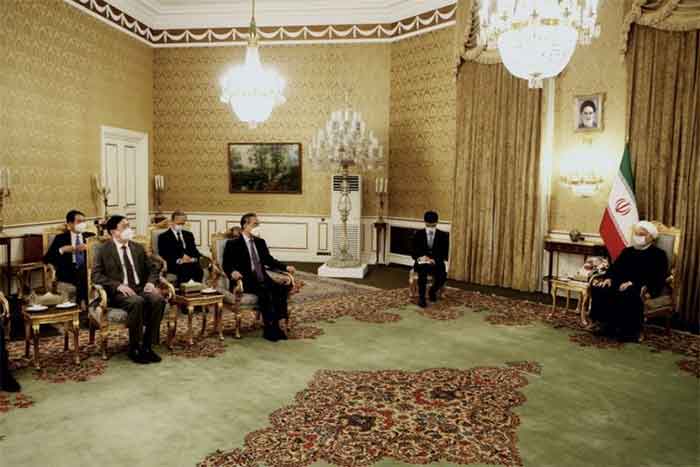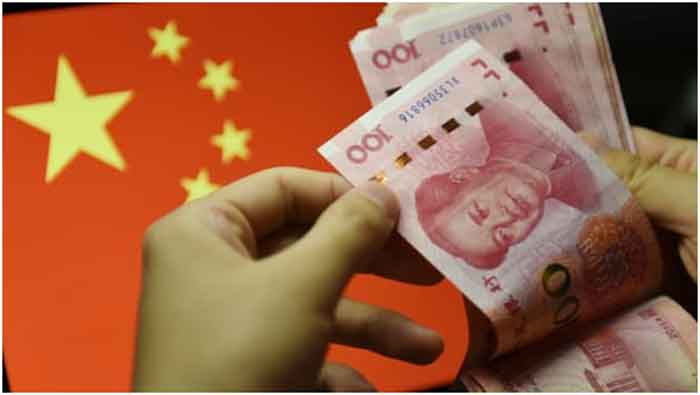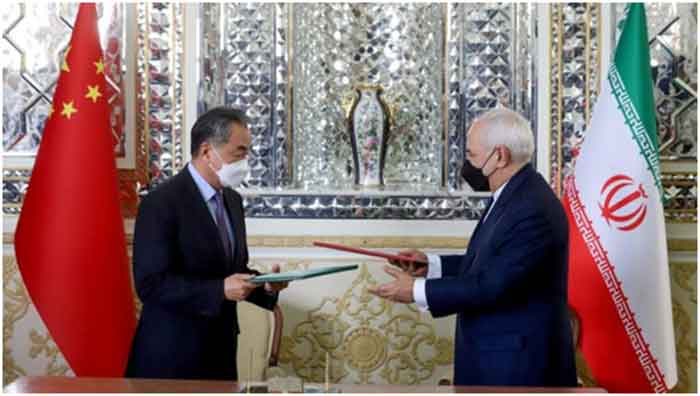Part II: China positions itself on the right side of history

See Part I: China neutralises the US campaign on Muslim Uighur issue
https://www.indianpunchline.com/the-china-iran-pact-is-a-game-changer-part-i/
In an exclusive interview with Al-Arabiya last week, China’s State Councilor and Foreign Minister Wang Yi outlined Beijing’s approach to the West Asian region with particular reference to the tensions in the Persian Gulf.
Wang lamented that “due to protracted conflicts and turmoil in the more recent history, the region descended into a security lowland… For the region to emerge from chaos and enjoy stability, it must break free from the shadows of big-power geopolitical rivalry and independently explore development paths suited to its regional realities. It must stay impervious to external pressure and interference, and follow an inclusive and reconciliatory approach to build a security architecture that accommodates the legitimate concerns of all sides.”
China’s “five-point initiative”
Wang has reiterated a Third Way. China has been espousing lately a “five-point initiative” devolving upon adherence to mutual respect (non-interference in internal affairs), equity and justice (read Palestine issue), non-proliferation (Middle East nuclear weapon free zone), collective security (proposal to hold in China a multilateral dialogue conference for regional security in the Gulf), and development cooperation (Belt and Road Initiative, Free Trade Agreements). It is not going to be easy for the US to match this Chinese package of “genuine multilateralism”. China is encouraging the regional states to adopt the politics of equity and justice, and “resistance” to the US bullying (which we normally associate with Iran) to create strategic autonomy.
China hopes to anchor its bilateral relationships on this new thinking which provides seamless possibilities to add solid content of great mutual benefit. Thus, an announcement came during Wang’s halt in Abu Dhabi (his destination after Tehran) that the UAE will start producing China’s Sinopharm vaccine next month as the first Gulf state to set up a coronavirus vaccine production facility with initial capacity to make 200 million doses annually, boosting its efforts to become a supply hub to West Asia and Africa.
On the other hand, just before Wang Yi’s arrival in Riyadh, the CEO of Aramco Amin Nasser announced, “Ensuring the continuing security of China’s energy needs remains our highest priority – not just for the next five years but for the next 50 and beyond.” The Saudi Crown Prince Mohammed bin Salman told Wang at the same time that Riyadh is keen “to continuously deepen” the bilateral cooperation” in crude oil, petrochemical, nuclear energy and other energy fields, “while also expanding it into new fields” such as 5G, telecommunication and digital technologies.
By the way, the 155th session of the League of Arab States Council at the level of foreign ministers adopted a China-related resolution on March 3, which reiterated the importance to strengthen China-Arab ties, and announced that Saudi Arabia will be hosting the first Arab-China summit this year. Wang called it an impressive marker and hopes to make the summit “a memorable event in the history of China-Arab relations.”
The US has never before faced from the Soviet Union or its western competitors this sort of challenge that China is posing today by offering to the regional states an altogether new path of development and governance that gives primacy to their national identity as sovereign states, keen to diversify their economies and not merely continue as gas stations for Big Oil.
China’s offer is seductive: it does not take sides in the intra-regional rifts and schisms and instead wants regional players to follow an inclusive and reconciliatory approach to build a security architecture of their own that accommodates the legitimate concerns of all sides.
And, yet, China calculates that the outcome will be that the region would eventually step out of the shadows of western dominance to independently pursue its policies and resist US pressure and interference. In short, a level playing field is what China is seeking in the near term.
Thus, while seeking that Iran should resume fulfilling its commitments on the nuclear issue, Wang suggested that the international community should also support the efforts of the regional countries to establish the Middle East as a nuclear weapon-free zone, and that for a consensual approach, all parties should discuss and formulate a route and timetable for implementing the Joint Comprehensive Plan of Action (JCPOA). Conceivably, this puts China in a pivotal role as mediator between Iran and its Arab neighbours.
Indeed, the ‘X’ factor is about the security and military cooperation under the China-Iran pact. No matter the strategic ambivalence on both sides on the issue, if US-Iran tensions deepen, Tehran will begin to see mutual advantage in allowing China (and Russia) to access its bases occasionally to counterbalance the US presence in the Persian Gulf. Without doubt, Iran will be seeking the transfer of advanced military technology from China (and Russia), once the UN embargo on such transactions end shortly under the framework of JCPOA.
The big volumes of oil and gas exports to China will boost Iran’s purchasing power. (China is reportedly ramping up its imports of Iranian oil already; imports are expected to reach levels of 856,0000 bpd in March, an 129% jump on February.)
Simply put, China will be generating income for Iran to realise its full potential as a regional power that cannot be cowed down.
Meanwhile, Saudi Arabia too is viewing China (and Russia) as its partner to develop an indigenous defence industry that reduces its dependence on costly purchases of weaponry from the western countries.
Iran senses that the hardening US attitudes toward China, as evident during the recent talks at Anchorage, have prompted Beijing to shed its earlier reticence and to switch to an overt outreach toward regional politics.
Wang Yi stressed in his remarks in Tehran that China is willing to oppose hegemony and bullying, safeguard international justice and fairness as well as uphold international norms together with people of Iran and other countries. “Our relations with Iran will not be affected by the current situation, but will be permanent and strategic,” Wang said. His punchline, of course, was: “Iran decides independently on its relations with other countries and is not like some countries that change their position with one phone call.”
Elsewhere, Wang stressed that China is consistent in opposing the unreasonable unilateral sanctions imposed on Iran by other countries, because they violate the international law, especially those based on lies and false information, which are immoral and unpopular and constitute an affront to human conscience.
He said China stands ready to work with Iran and other countries to jointly oppose the acts of bullying by powers, uphold international equity and justice, and defend the basic norms of international relations.
To be sure, Iran welcomes this marked shift in China’s diplomatic stance and sees distinct advantages in it. The Secretary of Iran’s Supreme National Security Council Ali Shamkhani, a highly influential figure in the country’s top echelons, has described the pact with China as “part of the active resistance policy.”
Wang pointed out that it is time to seriously reflect on the bad consequences inflicted on the region by external interferences, and work together to explore effective ways to maintain long-term regional security and stability. Of course, China is well aware that the regional divides (that are largely the creation of the western powers) will not disappear overnight. Nonetheless, Wang’s consistent message throughout the regional tour was that the regional countries should uphold their sense of ownership, carry forward the spirit of independence, get rid of the interference of geopolitical competition, seek development paths suitable for the national conditions, and establish a security framework in line with their interests.
China is playing the long game. Wang’s regional tour of West Asia marks China’s belief and confidence that it is on the right side of history.
***
Posted in his blog by M. K. BHADRAKUMAR
https://www.indianpunchline.com/the-china-iran-pact-is-a-game-changer-part-ii/
See also by the same author in the current series on the flux in the global scene
India’s agony and ecstasy over Quad, published on March 31, 2021
https://countercurrents.org/2021/03/indias-agony-and-ecstasy-over-quad/
China resents US presence in Afghanistan, published on April 1, 2021
https://countercurrents.org/2021/04/china-resents-us-presence-in-afghanistan/
This is how shingles of Indian interests in Myanmar overlap Russia and China’s, published on April 2, 2021
Ambassador M K Bhadrakumar served the Indian Foreign Service for more than 29 years. He introduces about himself thus: “Roughly half of the 3 decades of my diplomatic career was devoted to assignments on the territories of the former Soviet Union and to Pakistan, Iran and Afghanistan. Other overseas postings included South Korea, Sri Lanka, Germany, and Turkey. I write mainly on Indian foreign policy and the affairs of the Middle East, Eurasia, Central Asia, South Asia and the Asia-Pacific…”
His mail ID : [email protected]
GET COUNTERCURRENTS DAILY NEWSLETTER STRAIGHT TO YOUR INBOX












































